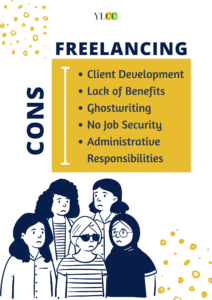
“The life of the professional writer – like that of any freelance, whether she be a plumber or a podiatrist – is predicated on willpower. Without it there simply wouldn’t be any remuneration, period.” – Will Self
What is freelancing?
A freelancer is a self-employed person who offers services, often working on several jobs for multiple clients at one time.
It is typically considered to be contrary to a fixed, salaried position at a company or an organization.
Lawyers or advocates who have their own private practice can be one of the most apt examples of freelancing.
The modern upside to freelancing

Freelancing is quickly becoming a preferred choice for working individuals across professions as it entails a number of strong advantages over being employed at an organization. Here we have discussed some of the major highlights:
- Flexibility of Hours
One of the biggest perks to freelancing is perhaps the flexibility of hours. A freelancer can choose to deviate from usual working hours and work at any other time of the day, as long as the project is completed within the stipulated deadline. Similarly, he or she can work in intervals instead of sitting at a workstation for long, uninterrupted hours. Personal convenience is key to determining the working time and duration.
- Autonomy
As compared to an ‘employee’, a freelancer enjoys exponentially higher degrees of autonomy in every aspect of the work. He or she can decide which clients to work with, which projects to accept, when to deliver and even his or her remuneration. A freelancer is his or her own boss in every sense of the term, as there is no organizational hierarchy that comes into play. The idea of freedom from a boss who imposes unrealistic expectations is greatly fulfilling for many freelancers!
If properly utilized, this autonomy can help achieve better productivity and greater job satisfaction.
- Better Pay
A major upside to freelancing is better financial prospects. An established freelancer usually generates more in revenue than his or her counterpart from the same field who is toiling in a corporate where the pay is fixed. In case of a freelancer, the harder one works, the more one earns.
In a post-Covid situation, freelancing also eliminates some of the major financial hazards of corporate employment- sudden paycuts and/or termination at the whim of the employer. A freelancer, on the other hand, has a fairly accurate idea of how much his earnings will be and therefore can plan his finances accordingly.
- Enhanced Work-Life Balance
The fair amount of autonomy at a freelancer’s disposal allows him to command better work-life balance. He or she does not have to give in to toxic, conventional practices at the workplace such as staying back unnecessarily after hours to win the boss’ approval or logging in least number of holidays taken to achieve the same end. In the absence of rampant exploitation, effective time management means that a freelancer can take a break to spend some quality time with the family or attend a relative’s wedding without having to worry for the larger consequences.
However one may choose to exercise this autonomy with self-restraint, especially at times when there is an opportunity at work to take on new clients or big projects.
- No Office Politics
Office politics make for a bitter experience at the workplace. Negative co-workers, constant and often unhealthy competition for incentives and good graces of the superior can lead to severe mental stress of an employee. A work place which promotes positivity and genuinely motivates its employee is indeed rare to find. This is one of the major reasons for many individuals to have switched to freelancing in recent times.
As a freelancer, one can focus exclusively on the quality of his or her work instead of having to engage in frivolous office gossip or peer-pressure induced breaks.
- Full Credit
Self-employment naturally means that you are always the sole beneficiary of your own work, both in terms of revenue and creative credit. This is hardly the case in companies where entry-level workers seldom get the credit for their own contributions and higher level workers steal away the praise for projects in which they have merely played a supervisory role.
Getting full credit for one’s own work certainly makes freelancing more lucrative as a career option.
- Increased Exposure and Skills
Additional tasks that a freelancer has to perform on a regular basis may compel the individual to extend his or her skillset beyond his or her area of expertise. For example, for marketing and branding, one may have to learn to navigate creative software like Canva or Photoshop, etc. This added exposure is greatly beneficial in the long run in terms of making the freelancer entirely self-reliant. An enhanced skillset also makes for a good impression and helps acquire clients easily.
The other side of the coin

Despite its undeniable perks, freelancing is far from a bed of roses. Compared to a typical job, freelancing offers its own unique downsides. Some of them have been briefly discussed below:
- Initial Investment
For your freelancing journey to be up and running, it is almost always imperative to create an infrastructural set-up which may include office rent, laptop/computers and other peripherals, branding costs and other expenses which are specific to the profession in question. Most freelancers, therefore, prefer to work from home in the initial days in order to minimize expenditure.
The initial investment usually originates from the freelancer’s own savings or sometimes one may also choose to raise funds from friends or family, or take a loan from a financial institution. This initial investment sets the scene and enables the freelancer to take on clients and provide services seamlessly.
- Non-Existent Job Security
One of the main tenets of criticism against freelancing is that it is a matter of privilege. Especially in India, it is a common perception that job security must hold utmost importance for a working professional. The idea remains that for people who have a responsibility to provide for a family, they should be earning a fixed amount per month.
Freelancing has necessarily emerged as an anti-thesis to job security. From a financial angle, it is often erratic and unpredictable- even the most established freelancers do not dismiss the impossibility of going long periods of time without any projects at hand- resulting from variable changes in market demand, etc.
- Ensuring Accountability
What may seem a plus at first- being your own boss- may soon turn into a nightmare. For many freelancers, ensuring accountability is an Achilles’ heel. Setting your own targets and meeting your own deadlines may be conducive to complacency which in turn will end up affecting you professionally.
Discipline is key to greasing the wheels of a self-accountability model. Working fixed hours, setting reasonable targets, systematically culminating a habit of completing a project on time will go a long way in sustaining smooth operations. You may often have to subordinate your own needs to your client’s.
- Inconsistent Workload and Income
Freelancing is characterized by inconsistency in terms of workload- number of new projects/clients, which reflects directly on the revenue. At times, the workload may be excessive which may require the freelancer to invest greater number of working hours to deliver projects on time. At other times, work may be stagnant which could create severe financial inconveniences.
Although this problem may be impossible to eliminate entirely, it is important that the freelancer addresses it early on and finds out ways (such as strategic personal branding and networking) to keep getting new clients and projects.
- Lack of Benefits
A significant challenge on the path to freelancing is the lack of benefits as opposed to a conventional job. Especially for someone who is making the transition from a full-time employee to a freelancer, the idea of no longer being on the receiving end of sweet corporate perks which may range from paid vacations to paid sick leaves can be disconcerting.
Apart from the usual benefits, some companies also bear costs like house rent, telecom bills, health insurance, etc. of the company. In freelancing, these are an additional burden on the purse of the freelancer.
- Client Development
For a beginner, client development can be an extremely tricky process. Client development encompasses the journey of networking, building contacts, acquiring clients and effecting strategic communication to obtain new clients as well as repeat orders from existing clients. It requires constant hard work, planning and most importantly, a patient approach that shall generate leads in the long run. Expecting overnight miracles is a fatal mistake at any given point of time.
- Administrative Responsibilities
Since a freelancer is running the whole show, besides doing the mainstream work, there are a number of secondary tasks that he or she has to perform in order to operate which include marketing, billing, keeping meticulous records, legal due diligence and other administrative work.
This becomes a problem as these tasks are mostly time consuming and it disallows the freelancer to commit his or her full time to working on client projects.
- Tax Consequences
In the absence of an employer which will initiate Tax Deducted at Source (TDS), freelancing implies that one is solely responsible for keeping track of his or her finances and filing the tax return accordingly.
10 Tips for Beginners
- Make sure you are enjoying what you are doing.
- Do not get complacent with existing clients.
- Keep finding new ways to promote yourself and your services.
- Keep your skills up-to-date and remain aware of the latest developments in your field.
- Network regularly with potential clients but also with other freelancers.
- Be aware of your competition but do not compare yourself to others.
- Take care of your own health- eat properly, sleep for fixed durations, and exercise.
- Wisely highlight your portfolio with past projects.
- Learn to take rejection in good stride and keep persevering.
- Take regular time off to avoid burnout.
From the aforementioned pros and cons, it becomes needless to reiterate that a successful freelancer regularly invests hours into meticulous planning and preparation in order to operate seamlessly without hiccups. Performing the due diligence as a freelancer goes a long way in overcoming the obstacles, building a reputation and successfully retaining and gaining clientele.
YLCC would like to thank Sourajit Bhattacharyya for her valuable inputs in this article.






